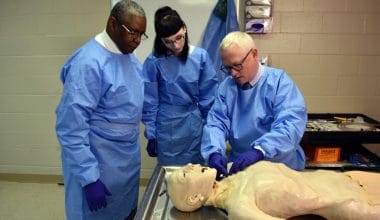Careers in education have long been considered to be profitable and satisfying. A Diploma in Special Education is a program designed to provide you with the practical skills and knowledge to train people with special needs.
You get to provide basic care and teach life skills, behavior, and social skills to cope with children with disabilities and special needs.
The program’s main goal is to prepare and train you for the pre-primary and primary grades. The program normally lasts two years, during which time you will study a variety of disciplines.
Special education is becoming a higher emphasis in schools, and the need for highly educated instructors with experience in the area is growing.
For individuals who are just searching for the appropriate program for them, the decision process may be very complex and even intimidating.
We’ve broken down the different processes on how you can get a special education diploma in this post.
Because of the scarcity of educated professionals, there is a strong need for all types of instructors.
What Is A Diploma In Special Education?
A diploma is a one- or two-year program that is not necessarily offered by a university. It may also be done by a polytechnic or an institution.
This diploma focuses on giving you the practical skills and information you’ll need to deal with people who have special needs. You’ll learn how to create and organize lesson plans, as well as how to manage a classroom and apply behavior control techniques.
A diploma can help you become better at time management, organization, communication, and critical thinking. It may also improve your job performance by showing employers that you have the persistence and knowledge required to be productive employees.
Is A Diploma In Special Education Equivalent To A Degree?
There are some similarities between a diploma in special education and a degree, but there are also significant distinctions.
- A special education degree program takes longer to complete than a diploma program. In addition, a diploma in special education requires the completion of fewer courses than a degree.
- A special education diploma is intended to give you the basic information you need to find work, while a degree provides more in-depth understanding.
- A degree program has additional requirements, and the prerequisites are greater than a diploma program in special education.
- Because a degree program covers a broader and deeper area of study, a diploma in special education is similar to the introductory portion of a degree program.
Why Earn A Diploma In Special Education?
A diploma in special education is an excellent long-term investment. Whether you want to teach special education in elementary school or middle school, we’ve got you covered. Here are a few reasons to pursue a diploma in special education.
1. Special Education Is Meaningful and Rewarding
The majority of persons who get a diploma in special education are dedicated to working with people who have disabilities.
Many of them consider working in special education to be a vocation, and they are eager to begin a satisfying profession in which they may be compensated for doing something emotionally fulfilling and personally significant.
Helping kids overcome an obstacle is a rewarding experience in and of itself, but this career path also offers excellent benefits and employment security. A special education certificate may help you start the fulfilling job you deserve.
2. Special Education Teachers Are In High Demand
Teacher shortages are a global issue. Because of the scarcity of educated professionals, there is a strong need for all types of instructors, with special education teachers being a specific need in many nations.
Because of the nationwide teacher shortage, many countries have begun to re-evaluate issues such as teacher pay, benefits, and certification requirements, resulting in an environment where individuals with a teaching degree can expect a higher salary, better benefits packages, and a smoother transition if they wish to move from one country to another.
In general, a teacher with a special education degree is more likely than ever before to enjoy job stability and a broader range of career choices.
3. Special Education Teachers Receive Great Pay And Benefits.
In May 2020, the median annual salary for special education instructors was $58,980, according to the Bureau of Labor Statistics. This is either above or on par with other jobs available with a teaching degree, depending on where you live.
Many states, on the other hand, are looking at ways to increase pay and benefits for special education teachers, since this is one of the areas where the teacher shortage has had the most impact.
A special education certificate also qualifies you for a range of jobs in governmental and nonprofit organizations that serve people with disabilities.
4. A Special Education Diploma Offers Many Career Paths
Many individuals are unaware of the many job possibilities accessible to those with a special education certificate. Special education graduates may pursue interesting and fulfilling jobs outside of the classroom.
Each state in the United States has programs dedicated to addressing the needs of people with disabilities, as well as a diverse range of commercial, governmental, and nonprofit organizations dedicated to the cause.
A special education certificate may lead to positions such as case manager, state supervisor, program coordinator, or nonprofit director. Special education experts may go on to lead nonprofit organizations as CEOs or as part of executive teams.
Some professional objectives may require obtaining a master’s degree in special education, which may be obtained via an online graduate program that provides a wide range of specializations.
5. Special Education Offers A Lifetime Of Learning
One of the reasons why a profession in special education is so attractive is that it allows you to study for the rest of your life.
All educators are dedicated to continuing their education, but in special education, a diploma is just the beginning. Each special kid brings with him or her a unique set of talents, difficulties, and fresh motivation for his or her instructors to learn more.
Scientific research and practitioners’ experiences, as we’ve seen with autism in recent years, provide fresh insights, which inspire teachers to become lifelong learners.
Sometimes special education professionals acquire a passion for a topic and opt to further their studies in order to shift their professions to this new area of expertise.
What Can You Do With A Diploma In Special Education?
With a Diploma in Special Education, you’ll be prepared to work as a teacher, classroom assistant, or paraprofessional educator in both public and private schools.
Working with social service agencies, school therapy settings, and home health organizations to provide home care, education, and therapy to people with specific and varied needs is also an option. You may also work in a daycare, adult care, or nursing home setting.
You may also work with your school to discover a full-time, part-time, or online educational route that works for you.
How Much Can You Earn With A Diploma In Special Education
According to the Bureau of Labor Statistics (BLS), a special education teacher’s median annual income was $59,780, with secondary and middle school instructors earning the most.
Overall, employment growth in the special education teaching profession is projected to be about 3% through 2028.
How Long Does It Take To Complete A Diploma In Special Education Program?
A diploma program in special education takes two years to finish. The course is split into semesters, and in order to get a diploma, you must pass all of the semester examinations.
However, different schools have different time frames for their programs, but they are all within or somewhat outside of that range.
How Much Does It Cost To Get A Diploma In A Special Education Certificate?
Students wanting to pursue a special education diploma program should budget between $2,000 and $12,000.
In addition, the cost of a certificate program varies based on the institution you want to attend. The majority of students see the expense as an investment in their future profession. You may also contact the administration office for additional information on tuition and other expenses.
How Can I Get A Diploma In Special Education In 2024?
If you want to get a diploma in special education, you must complete specific procedures just like you would for any other academic program.
This, however, varies based on the institution where you want to pursue the program, but the most typical stages are as follows:
- You should be enthusiastic about pursuing a profession in teaching and have a strong desire to do so. This is the first stop on the road to earning a special education diploma.
- Make a list of the colleges and universities that provide the finest diploma in special education programs for you. Checking tuition payments and any other monies required for the diploma program is part of this process. You may also want to look into the essential papers for the program and have them ready at this time.
- To continue, go to the school’s website and fill out the application form. In certain instances, universities handle the application and registration processes on their own campus.
- Upon receiving the admission notification/letter, go to the school portal to register as a new student or go to the school campus to complete the new student registration, whichever is the case, whether it is a distance learning program or an on-campus program.
- Take courses seriously after academic activities have resumed. Take quizzes, assignments, and examinations when they are due, and make the required pass mark, whether it is virtual or in a conventional classroom setting.
What are the Requirements for a Diploma in Special Education Program?
Applicants for a diploma in special education must submit their authentic high school credentials as well as their college transcripts.
You must also have a minimum GPA of 2.5 or above, indicating that you have completed your basic schooling.
For international students, English language competence exams such as IELTS, TOEFL, and others are also needed.
Read Also: How Can I Get A Diploma In Translation In India? | 2024 Schools, Cost, Salary, Career
Which Schools Offer The 10 Best Diploma In Special Education Programs In 2024?
A relevant diploma in special education programs is available from a number of accredited institutions across the globe.
We’ll take a look at some of the degrees offered by special education certifying institutes below.
1. Diploma In Education Assistant/Community Care Support Worker – Human Services Certificate In North Island College
North Island Institution, located on beautiful Vancouver Island on Canada’s West Coast, is a small public college that offers a variety of programs, including certificates, diplomas, a business degree, and post-graduate degrees.
The program prepares you to provide support and assistance to people with a wide variety of abilities. The workplace allows you to make relationships with employers and get first-hand experience.
Learn to work as an educational assistant or community supporter in schools, group homes, employment agencies, and community groups, or transfer to NIC’s Human Services diploma program.
2. Diploma In Special and Inclusive Education (Online) In Dublin City University
The course’s main goal is to help primary and post-primary mainstream class instructors improve their skills and competencies in response to the demands of inclusive education policy and practice.
The course intends to provide teachers the chance to improve their knowledge, skills, and competencies in important areas of inclusive and special educational provision and planning at the school and classroom level.
This program seeks to provide individual teachers with professional development in the field of special and inclusive education. It also seeks to build a community of learners who will interact and cooperate in order to assist the teaching and learning of students with special and extra needs.
The program is designed to assist candidates in meeting the growing variety of needs of students in mainstream courses.
Candidates are able to engage in organized, intense, and sustained continuing professional development at convenient times, in a readily accessible manner regardless of location, while also allowing for the actual application of skills acquired in the classroom.
3. Diploma In Inclusive Education In Athabasca University
Its Inclusive Education diploma is provided in conjunction with the University of Alberta and is aimed mainly at teachers. The program improves instructors’ special education knowledge and abilities.
You’ll get 24 credits by taking courses at either Athabasca University or the University of Alberta since both offer comparable courses. It is suggested that you finish your core courses at your home university after you have been accepted.
A Diploma in Inclusive Education may lead to jobs as a special education teacher, resource room or learning assistant teacher, resource facilitator, or special education consultant for licensed instructors with a Bachelor of Education.
This curriculum may lead to working as a special needs assistant for teaching assistants or students who are not licensed, instructors.
4. Professional Certificate in Education (Autism Spectrum Conditions) in the University of Melbourne
The Professional Certificate in Education aims to provide you with a comprehensive understanding of the strengths and needs of students with autism.
The course includes research from the fields of education and psychology to give you an understanding of how you can help them learn better.
It is designed to help you understand what it is like to be a teacher for a student with autism, as well as how you can help their learning.
You’ll discover how evidence-based treatments may improve learning and encourage good behavior, and you’ll build a toolkit of instructional techniques that you can use right now in your professional setting.
Read Also: HOW CAN I GET A DIPLOMA IN PROJECT MANAGEMENT IN 2024? SCHOOLS, SALARY, CAREER
5. Diploma Educational Assistant In Lethbridge College
Your patience, creativity, and understanding can make a positive impact in a student’s life; the school will teach you how and provide you with all you need to begin this wonderful profession.
You’ll learn how to assist kids who are struggling academically or who are dealing with behavioral problems, as well as how to recognize a variety of impairments and how to support them in an inclusive classroom environment.
As you work toward a meaningful profession, you may enroll online for one year (for a certificate) or two years (for a certificate and diploma).
5. Diploma In Supporting Individuals with Autistic Spectrum Disorder In University of the Highlands and Islands (UHI)
While working with people with Autistic Spectrum Disorder, this course provides a chance to get a relevant certification. You will improve your ability to recognize the type and range of autism.
The course will enable you to show your knowledge of the three types of impairments and their consequences for caregiving.
You’ll get the chance to look at problems of work practice consistency and acquire an understanding of intervention methods. You will learn via online study as well as on-the-job experience.
6. Diploma In Assessing And Teaching Learners With Dyslexia/Specific Learning Difficulties In Herefordshire And Ludlow College
This course was created to recognize the abilities, knowledge, and understanding of applicants as specialized instructors.
It also improves their capacity to conduct diagnostic tests, produce reports, and provide effective instruction to children with dyslexia and other particular literacy and numeracy problems.
Read Also: GED vs High School Diploma: Differences and Similarities
8. Professional Diploma/Certificate In Special And Inclusive Education In Institute Of Child Education And Psychology
ICEP Europe is a well-known provider of online continuing education and professional development for educators and other professionals who deal with children and adolescents.
This course integrates theory, research, and best practice methods to help you address the varied learning requirements of students with special educational needs in a practical way.
Access is made possible by the flexible online delivery, which allows anyone to participate regardless of their location or other restrictions. This course is offered part-time and is modular, allowing you to study at your own pace and pay as you go.
9. Diploma In Supporting Teaching And Learning (Evening) In Hertford Regional College
This certificate will provide you a thorough grasp of the information and abilities required when working with children and teenagers in school and college settings.
Specialized learning includes planning, implementing, and evaluating assessment methods to enhance learning with the teacher.
It also includes bilingual support; special needs support; personal development and reflective practice; and multilingual support.
10. Diploma for Special Education Assistant In College Nordique Francophone
You will concentrate in elementary and secondary education for children with exceptional needs throughout this two-year program.
You’ll discover how to provide them with the assistance they need to thrive and become active members of their communities.
Conclusion
Students with impairments are one-of-a-kind people with a wide range of requirements.
As a special education teacher, you’ll be tasked with identifying the precise solutions that will meet your kids’ requirements. Every day is a fresh problem to solve in terms of determining what each pupil needs.
Read Also: How To Get High School Diploma | Step-by-Step Guide
FAQ’s on Diploma in Special Education
Yes, you can obtain a diploma in special education once you graduate as long as you complete all of your examinations with a minimal percentage.
Yes, several institutions provide this diploma degree in an online format. You may learn more about this unique feature on each institute’s website.
An applicant for a special education diploma must be 17 years old or older.
This varies by state and school. Although many states prohibit special education instructors from instructing general education students, some do. Furthermore, private schools have different criteria than public institutions. It’s advisable to verify with your state’s school board.
References
- Diploma in Special Education | Course Details, Duration, Fee Structure, Eligibility Criteria, Job and Salary
- Special Education Teacher Career Guide
- TOP 10 REASONS TO GET A SPECIAL EDUCATION DEGREE
- Diploma Programs in Special Education
- 7 Reasons to Become a Special Education Teacher





